| Srl | Item |
| 1 |
ID:
087296
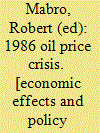

|
|
|
|
|
| Publication |
Oxford, Oxford University Press, 1988.
|
| Description |
xii, 286p.
|
| Standard Number |
0197300073
|
|
|
|
|
|
|
|
|
|
|
|
Copies: C:1/I:0,R:0,Q:0
Circulation
| Accession# | Call# | Current Location | Status | Policy | Location |
| 029496 | 338.23/MAB 029496 | Main | On Shelf | General | |
|
|
|
|
| 2 |
ID:
089128
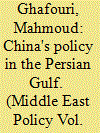

|
|
|
|
|
| Publication |
2009.
|
| Summary/Abstract |
Since 1996, China has become a net importer of crude oil, currently the second-largest consumer in the world after the United States and the third-largest importer of oil after the United States and Japan.
|
|
|
|
|
|
|
|
|
|
|
|
|
|
|
|
| 3 |
ID:
058234
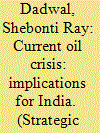

|
|
|
| 4 |
ID:
128140
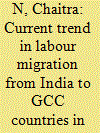

|
|
|
|
|
| Publication |
2014.
|
| Summary/Abstract |
Migration and movement of human population have always been an integral element in the history of mankind. India has been experiencing large-scale migration to foreign countries since centuries and in the current globalised era. The International Labour Organization - ILO has classified international migration for employment in to two major categories including settlement migration and contract migration (ILO, 1989). The contract migration is unique phenomenon practiced in few western countries but in particular in the GCC countries post oil boon during 1970's as the governments used sharply higher oil revenue to build infrastructure and housing, and expand the economy (Seccombe, 1985).
|
|
|
|
|
|
|
|
|
|
|
|
|
|
|
|
| 5 |
ID:
128099
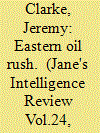

|
|
|
|
|
| Publication |
2012.
|
| Summary/Abstract |
Followign Tullow Oil's major discovery in Turkana county,Kenya has seen a surge in interest from foreign oil companies. Jeremy Clarke assesses the various security risk facing the country's nascent oil industry and the likely impact on the 2013 election.
|
|
|
|
|
|
|
|
|
|
|
|
|
|
|
|
| 6 |
ID:
126565
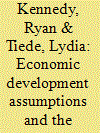

|
|
|
|
|
| Publication |
2013.
|
| Summary/Abstract |
Scholars have argued that oil resources lead to poor quality institutions and governance, which causes slower economic growth, an increased propensity for civil war, and other maladies. Such conclusions, however, rest on strong modernization assumptions that oil resources are unrelated or detrimental to the level of economic development. Utilizing a unique multilevel version of extreme bounds analysis (EBA), we find that oil's deleterious effects on governance are not well established. Instead, when we relax strong assumptions about the exogeneity of economic development and utilize more objective indicators of institutional quality, oil has a net positive impact on governance. Moreover, when accounting for endogeneity, there is little to suggest either an intervening or independent effect of poor governance on civil conflict in petro-states.
|
|
|
|
|
|
|
|
|
|
|
|
|
|
|
|
| 7 |
ID:
124380
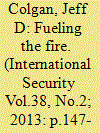

|
|
|
|
|
| Publication |
2013.
|
| Summary/Abstract |
What role does oil play in international security? While the threat of "resource wars" over possession of oil reserves is often exaggerated, the sum total of the political effects generated by the oil industry makes it a leading cause of war. Between one-quarter and one-half of interstate wars since 1973 have been connected to one or more oil-related causal mechanisms. Eight distinct mechanisms exist: resource wars, in which states try to acquire oil reserves by force; petro-aggression, whereby oil facilitates domestic political control of aggressive leaders such as Saddam Hussein or Ayatollah Ruhollah Khomeini; externalization of civil wars in petrostates; financing for insurgencies, such as Iranian oil money to Hezbollah; conflicts over potential oil-market domination, such as the United States' conflict with Iraq over Kuwait in 1991; control over transit routes, such as shipping lanes and pipelines; oil-related grievances, whereby the presence of foreign workers in petrostates helps extremist groups such as al-Qaida recruit locals; and as an obstacle to multilateral cooperation, such as when an importer curries favor with a petrostate to prevent multilateral cooperation on security issues. Understanding these mechanisms can help policymakers design grand strategy and allocate military resources
|
|
|
|
|
|
|
|
|
|
|
|
|
|
|
|
| 8 |
ID:
127884
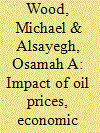

|
|
|
|
|
| Publication |
2014.
|
| Summary/Abstract |
This paper describes the influences of oil revenue and government's policies toward economic developments and energy efficiency on the electricity and water demands. A Kuwait-specific electricity and water demand model was developed based on historic data of oil income, gross domestic product (GDP), population and electric load and water demand over the past twelve years (1998-2010). Moreover, the model took into account the future mega projects, annual new connected loads and expected application of energy conservation programs. It was run under six circumstances representing the combinations of three oil income scenarios and two government action policies toward economic diversification and energy conservation. The first government policy is the status quo with respect to economic diversification and applying energy conservation programs. The second policy scenario is the proactive strategy of raising the production of the non-oil sector revenue and enforcing legislations toward energy demand side management and conservation. In the upcoming 20 years, the average rates of change of the electric load and water demand increase are 0.13 GW and 3.0 MIGD, respectively, per US dollar oil price increase. Moreover, through proactive policy, the rates of average load and water demand decrease are 0.13 GW and 2.9 MIGD per year, respectively.
|
|
|
|
|
|
|
|
|
|
|
|
|
|
|
|
| 9 |
ID:
081585
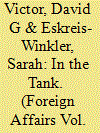

|
|
|
|
|
| Publication |
2008.
|
| Summary/Abstract |
Oil stocks can help buffer economic shocks, but only if Washington radically reforms its handling of them
|
|
|
|
|
|
|
|
|
|
|
|
|
|
|
|
| 10 |
ID:
060870
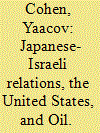

|
|
|
| 11 |
ID:
154084
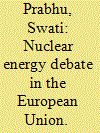

|
|
|
|
|
| Summary/Abstract |
With the global community strongly debating on mitigating climate change and adapting a cohesive environmental policy, the issue of using nuclear energy stands at a crossroad. This constant pursuit of procuring several energy resources has resulted in several challenges for the international community. During the 1970s as fallout of the oil crisis, nuclear energy emerged as a major game changer which critically highlighted the need for achieving energy security.
|
|
|
|
|
|
|
|
|
|
|
|
|
|
|
|
| 12 |
ID:
089931
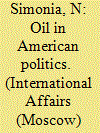

|
|
|
|
|
| Publication |
2008.
|
| Summary/Abstract |
Gradual consolidation at the domestic oil front allowed the American oil producers to ship their product in large quantities to Europe living through its industrial revolution. In 1870s and 1880s, America exported the larger part of the locally produced kerosene to Europe and Russia, two largest markets at that time.
|
|
|
|
|
|
|
|
|
|
|
|
|
|
|
|
| 13 |
ID:
058242
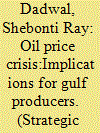

|
|
|
| 14 |
ID:
020067
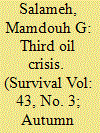

|
|
|
|
|
| Publication |
2001.
|
| Description |
p129-144
|
|
|
|
|
|
|
|
|
|
|
|
|
|
|
|
| 15 |
ID:
068243
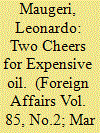

|
|
|
| 16 |
ID:
059339
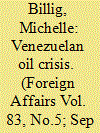

|
|
|
|
|
| Publication |
Sep-Oct 2004.
|
|
|
|
|
|
|
|
|
|
|
|
|
|
|
|